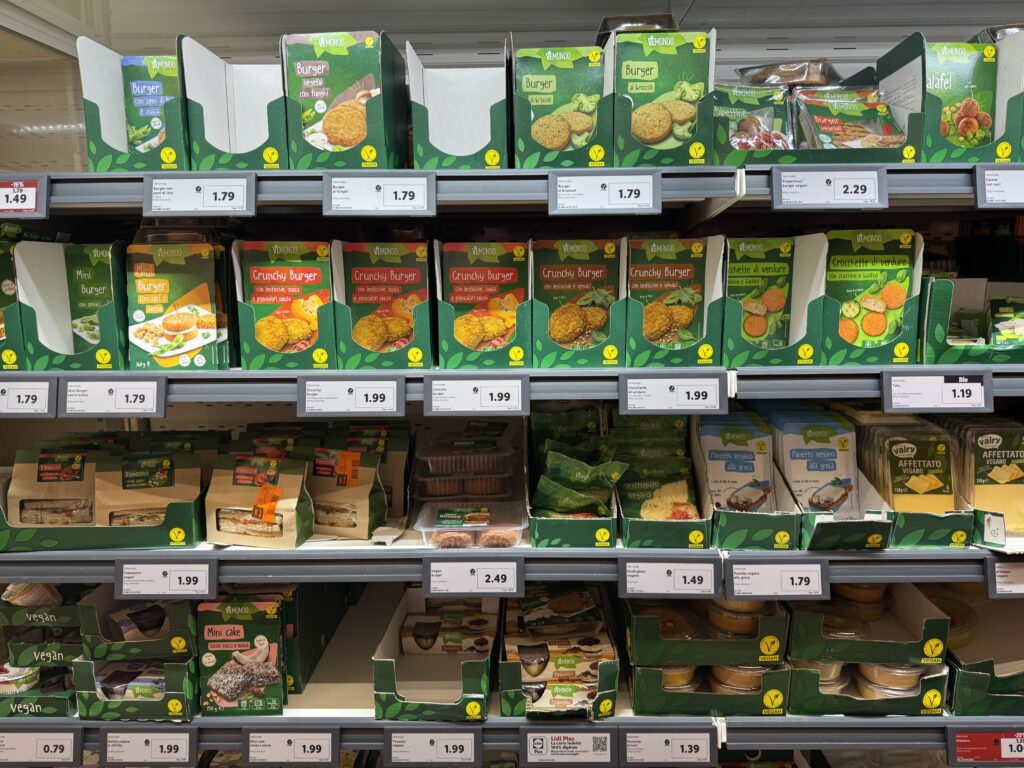5 Mins Read
Italy’s plant-based market is bucking the global decline, but there are several missed opportunities for companies and the industry as a whole.
It has been two months since Gruppo Tonazzo, an Italian company that had been producing meat for 136 years, announced it was pivoting to a fully plant-based business model.
The move – described as “a gesture of great responsibility towards the environment and the nutritional wellbeing of future generations” – was a marker of vegan food’s strong foothold in Italy.
While the plant-based sector has seen setbacks in several markets across the globe – sales were down in countries like the US and the UK, all the way to Australia. But Italy was among the nations that went the opposite direction, with retail sales of vegan food reaching €641M in 2023, an 8% jump from the previous year.
In the first four months of 2024, too, Italians spent 6.5% more on plant-based food than the corresponding period a year ago, according to Circana data commissioned by the Good Food Institute.
These trends were driven by Italians’ shrinking appetite for meat, with nearly six in 10 aiming to cut back on these products last year – driven mainly by health reasons. At the same time, meat alternatives make up a third of the country’s plant-based market share, behind only non-dairy milk.
“Italy represents a unique gateway for companies looking to enter the plant-based sector, thanks to its culinary tradition and growing demand for sustainable solutions,” says Felippe Fontanelli, founder of the Virtuous Food Revolution Alliance and co-founder of Rethink Pasta.
He is the author of a new report, titled ‘The Hidden Gem of Europe’s Plant-Based Market: The Rise of a New Made in Italy’, which explores the country’s potential to be a leader for vegan food, and the challenges the sector faces.
“This report provides a detailed market overview and guides companies in navigating this complex landscape, aligning with Virtuous’s mission to strengthen the Italian plant-based ecosystem,” adds Fontanelli.
Here are five measures Italy could propel its plant-based industry to greater heights.
1) Look to the young

Young Italians are driving the adoption of sustainable diets, with 82% of 17- to 35-year-olds doing so on account of health and climate concerns, according to the 2024 Coop Report. This demographic, titled the Explorers, is leading the shift towards flexitarianism in the country, and three-quarters of them believe reducing meat is crucial to combat the climate crisis.
The demand isn’t just for plant-based burgers, but innovative and familiar plant-based products that fit into their lives seamlessly. This is an opportunity ripe for Italy’s €81B out-of-home market, with fast-food chains like Burger King and KFC – frequented by youngsters – introducing plant-based versions of menu classics.
2) Tap into specialised distributors
Young and disruptive distributors, like Mr. Root in Milan, provide a crucial entry point for vegan food manufacturers. They cater to premium outlets and restaurants looking for unique, healthy, and delicious products to integrate into their menus.
“Specialised distributors give innovative plant-based brands market access, focusing on premium outlets, while larger distributors stick to established brands,” writes Fontanelli. The lack of receptiveness from the bigger distributors isn’t due to low interest, but because it requires “significant focus” to convey the unique value of each brand.
“Startups often face challenges, including high team turnover, unstable product availability, constant packaging revisions to meet local regulatory standards, and limited budgets, all of which make long-term continuity difficult in such a competitive market,” the report states.
3) Retailers must amp up collaboration

Fontanelli argues that Italy’s supermarkets are missing opportunities in the expanding vegan market. While centralised chains like Aldi, Lidl, Esselunga and Carrefour have expanded their plant-based lines, decentralised retailers that operate under regional purchasing models – such as Coop and Conad – have been slow to adapt. This has made it extremely difficult for startups and SMEs to get a foothold on their shelves, the report argues.
This is why the industry requires “a cultural shift towards more collaborative initiatives” between retailers and brands. This can be done by establishing strategic initiatives to reduce the operational barriers smaller companies face when trying to expand their reach, creating dedicated sections for plant-based products, supporting local supply chains, and developing marketing initiatives to highlight their benefits.
4) Reinvent the classics

Despite the dominance of industry giants like Nestlé, Valsoia and Tonazzo, significant prospects remain for innovative plant-based brands, heralded by young entrepreneurs. These startups can capitalise by reimagining Italian culinary classics with a sustainable and health-forward twist.
“This movement spans across the plant-based dairy, meat, and dessert sectors, blending modern innovation with culinary excellence,” writes Fontanelli. Among the challenger brands leading the charge are alt-dairy players Heaven, Dreamfarm and SQUP, as well as cocoa-free chocolate producer Foreverland.
That said, despite Italy’s cuisine being one of the homes of the whole-food, plant-forward Mediterranean diet, the opportunity for larger food producers to fully integrate plant-based innovation into the Mediterranean diet’s global appeal is largely untapped – addressing it could help position Italy as a leader in the industry.
5) Target the ready-meal vertical

Building on the local context, Fontanelli highlights the popular trend of vegan food producers collaborating with ready-meal brands to expand their customer base. These companies regularly veganise Italian classics like lasagne, filled pastas, sauces, snacks, and pizza toppings, and this allows plant-based brands to leverage consumers’ familiarity with local cuisine.
Successful examples include Beyond Meat’s partnership with De Angelis and Future Farm’s deal with Rethink Pasta. Even international cuisines are gaining in popularity, particularly among the Explorers. This is an area being tapped by brands like Planted, which has teamed up with I Love Poke, and Current Foods, whose vegan seafood is on the menu at Poke House.
“The Italian market is not for the faint-hearted. It is a market for those who are in it for the long haul, willing to put skin in the game to transform the food system,” warns Fontanelli. “The players succeeding in Italy today recognise the long-term potential and are prepared to navigate its unique challenges to drive systemic change.”
He adds: “For companies with vision and commitment, Italy represents one of the most dynamic opportunities in Europe’s plant-based landscape – a market with incredible growth potential for those ready to invest in its future.



